Social media provides a dynamic environment for B2B companies to test and refine their brand strategies. According to research conducted by eMarketer last year, 60% of B2B marketers named social media the most effective channel for driving revenue.
With strategic engagement on social media platforms, B2B companies can connect more personally and directly with potential clients, partners, and stakeholders. Social media also helps get direct customer feedback so businesses can quickly identify what resonates with their audience and make timely adjustments, building stronger relationships and enhancing brand credibility and trust.
Engaging content, thoughtful interaction, and a consistent presence on social media are what significantly contribute to a B2B company’s growth and visibility.
Next, we’ll describe different marketing strategies to implement into a B2B company’s social media profile.
1. Social media accounts as landing pages for social ads
According to Hootsuite, 66% of mid-level managers actively use social media to stay updated on industry news and trends and connect with fellow industry leaders. By 2025, social media users are expected to increase to 5.3 billion globally, increasing chances for business outreach and consumer engagement.
One way to utilize social media platforms is to use them as landing pages for social ads. If your business is running social ads to increase brand awareness, there is a high possibility that some people who encounter the ads might want to explore the brand’s social media accounts. Thus, having an active, professional, and engaging social media presence will help them learn more about your brand.
Let’s see a good example of a B2B social media account:
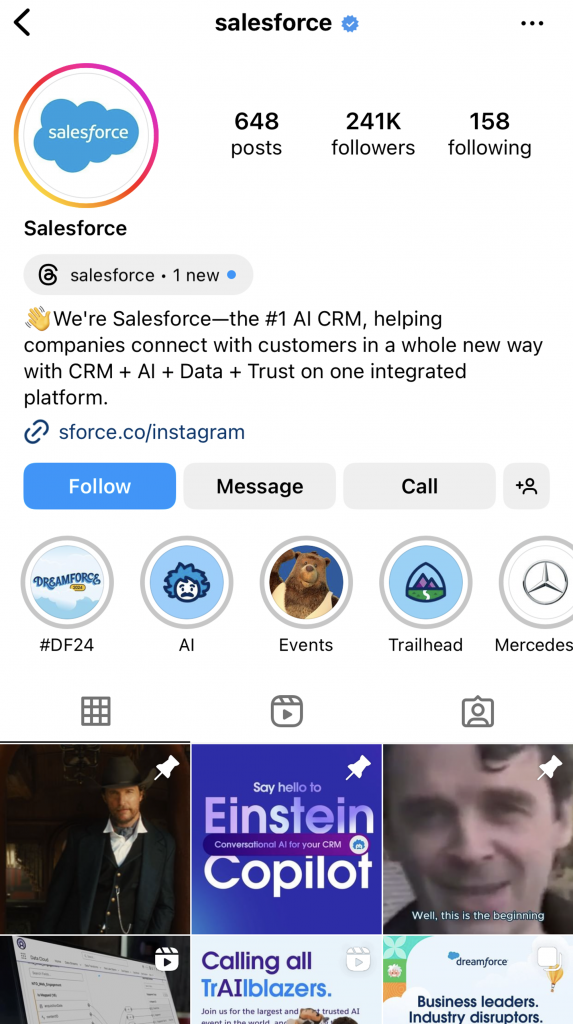
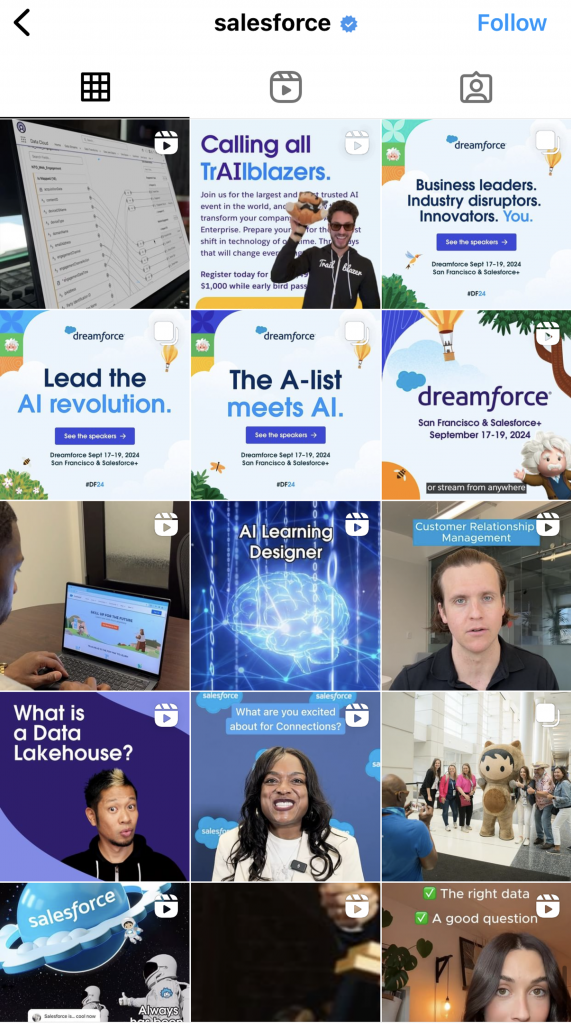
Salesforce does a great job on their Instagram profile—they communicate what the company does in the account bio, have Instagram highlights for easy information access, and offer informative, educational, and engaging content for users.
Now, let’s review this Instagram account:
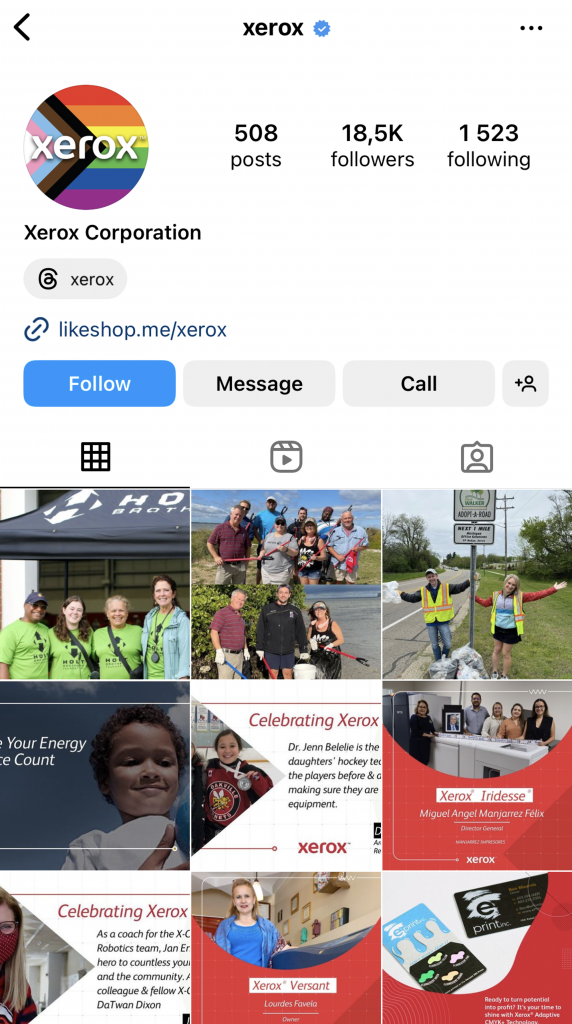
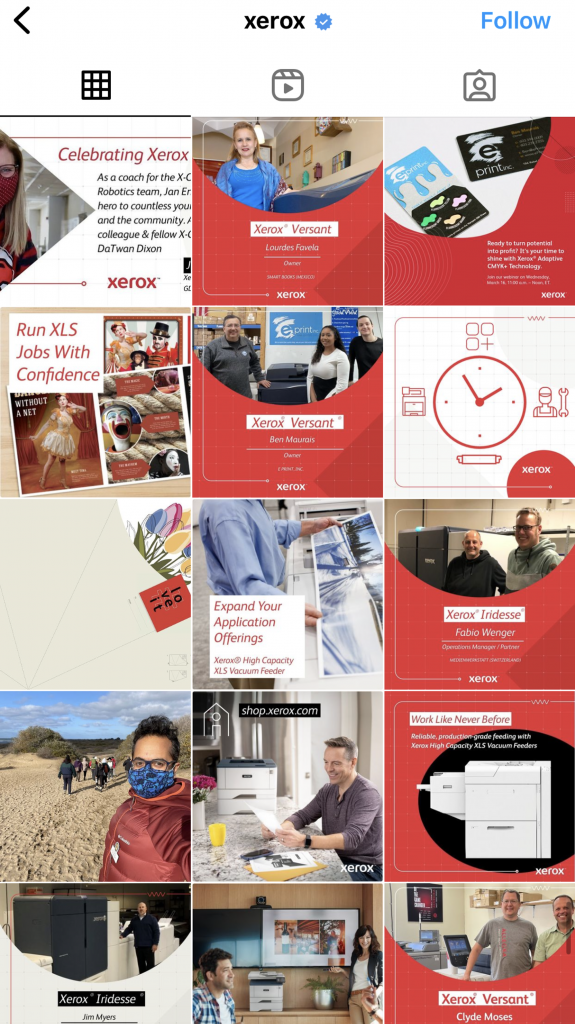
We can spot the lack of communication through social media bio or story highlights and content on the account. The brand’s main focus is on highlighting its employees, which is a good practice but not enough to create an interesting and engaging social media account for the new users who land on the page.
2. Social media to showcase your expertise and build relationships with clients
As of 2024, social media has over 4.9 billion users worldwide, growing at an average of 4.5% yearly. Therefore, it is a great place to build relationships with your clients and showcase your expertise in your field. The strongest and most successful B2B partnerships are based on good relationships, and social media can be one of the channels to keep them alive. It enables the sharing of valuable content and engages and makes conversation at the same time, allowing you to be the immediate source of information.
Here are some content types you can leverage on your B2B social media accounts:
- Industry insights and trends
- Customer success stories
- Industry news and updates
- How-to guides and tutorials
- Behind-the-scenes content
- Interactive polls and surveys
- Event highlights and recaps
Check out Buffer’s social media presence on their Instagram account! You can find new Buffer features, industry insights, how-tos, and much more.
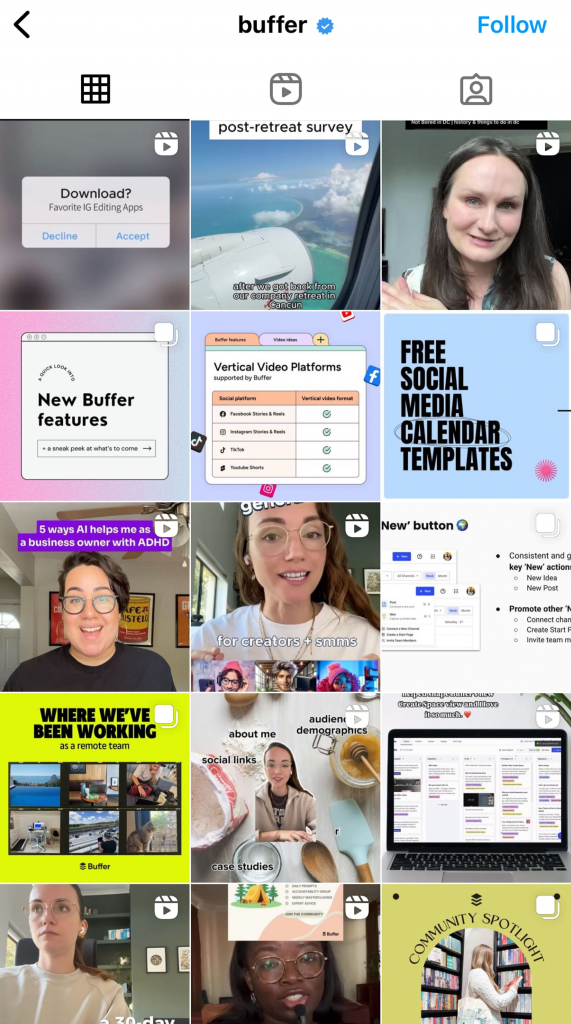
3. Social media to attract future employees
According to Jobvite’s 2024 Employ Job Seeker Nation Report, 72% of job seekers use social media platforms to research potential employers before applying. This is particularly important for platforms such as LinkedIn, where people expect to see company values and how they showcase their knowledge in the field. Properly representing the brand can help attract the best candidates to the company.
Hootsuite is a great example of a successful social media presence. They take a relatable, informative, and fun approach to social media accounts, which drives a good engagement rate on the accounts.
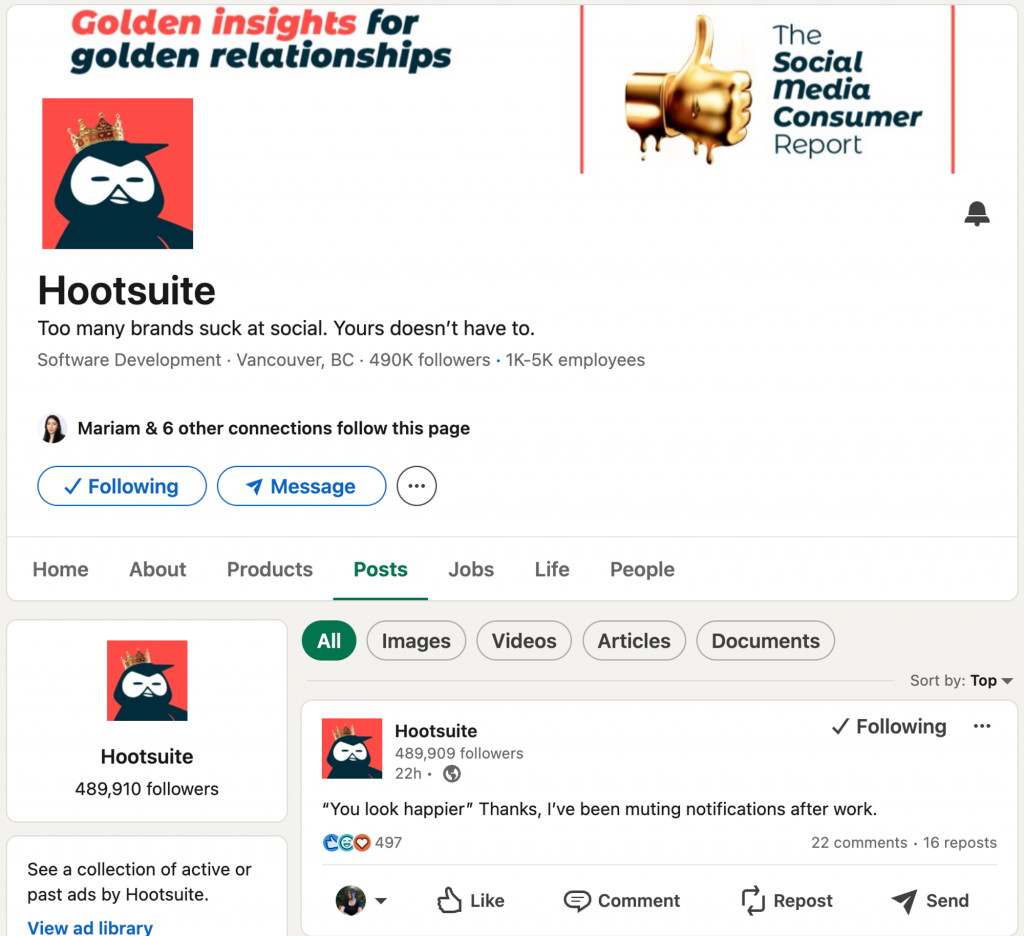
4. Social media to increase your reach
Approximately 4.2 billion people use social media daily, covering almost all demographics, and your audience is there, too. With an active presence, you can engage with a wide range of potential customers from various backgrounds, interests, and locations.
Areas where social media can help to increase your reach:
- Brand awareness and engagement
- Broad audience reach
- Wider content visibility
Also read:
Growing Brand Awareness Through Social Media: From 50 to 1,000 Followers in 2 Weeks on Instagram
However, it is important to keep in mind that different social media channels serve different purposes for B2B brands; thus, choosing the right social media platform might be vital to your strategy.
- LinkedIn is ideal for sharing industry insights and connecting with other professionals
- Facebook helps brands reach wider audiences, build and engage with communities
- Instagram is mainly targeted for visual appearance, so it’s important to keep this in mind while creating your brand’s Instagram strategy
- Pinterest serves well for driving traffic to your website through visually appealing pins
- TikTok helps brands to create short, creative videos that showcase their personality.
5. Social media for personalized marketing strategies
Personalized marketing strategies can foster a stronger emotional connection with the brand and lead to increased loyalty. Social media allows B2B brands to personalize their marketing approaches in ways that directly resonate with users, leading to higher interaction.
Here’s how social media can help you personalize your brand’s marketing strategies.
Tailored content based on user preferences
Social media accounts collect data from user interactions towards published content. Brands can analyze the data and create content that resonates with the audience more.
Targeted advertising
Social media allows for highly targeted advertising, where brands can deliver specific messages to different audience segments based on demographics, interests, and online behaviors.
Personalized messaging
With social media, brands have direct communication with customers through personalized messages or responses.
Localized content
Social media accounts can help brands create content that reflects local culture and events and help brands connect with users on a more personal level.
Storytelling and personal connection
Sharing behind-the-scenes content helps brands humanize themselves and makes the relationship between the brand and users genuine.
Leveraging social media effectively can provide B2B companies with powerful tools to build relationships, showcase expertise, attract talent, and expand their reach. With personalized marketing strategies and an active, engaging presence, businesses can enhance their visibility and foster trust and credibility within their industry.
Looking to transform your B2B social media strategy? Browse our digital marketing services and use the contact form to schedule a free consultation. Our social media team will get back to you with a plan within 48h!
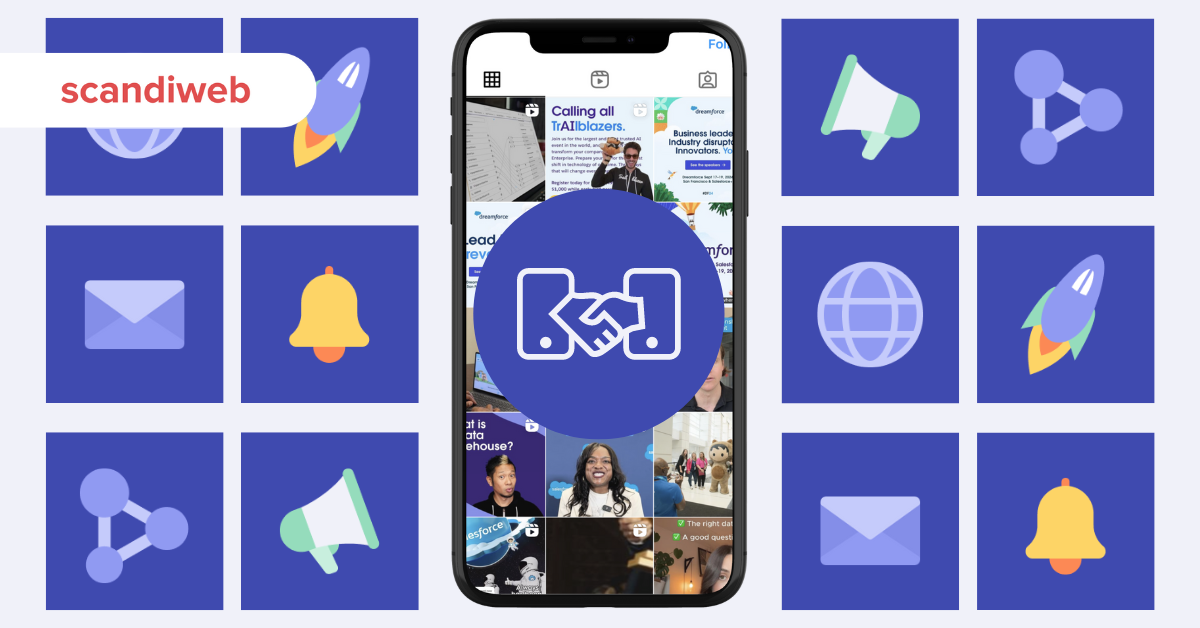


Share on: